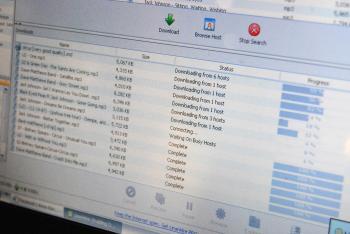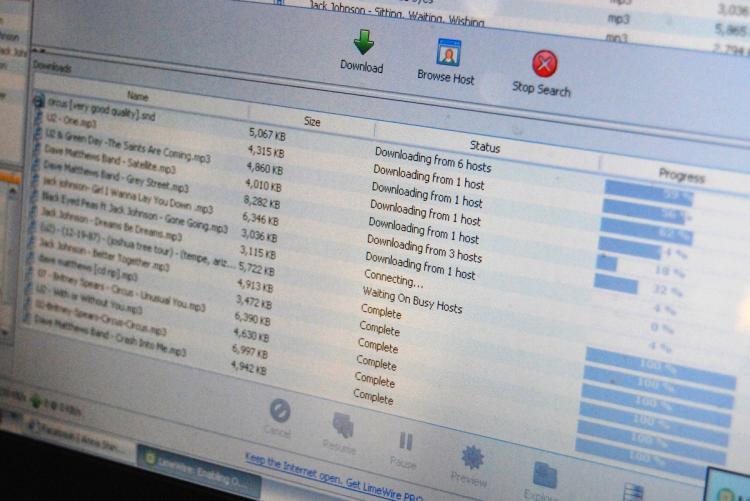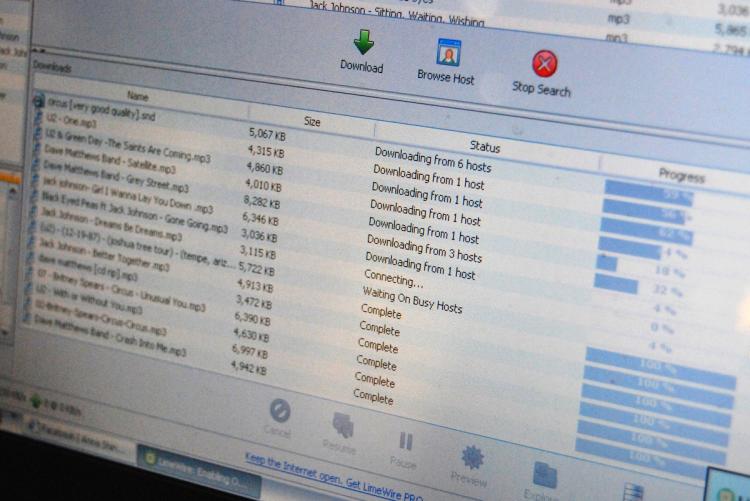The U.S. Department of Homeland Security is cracking down on illegal websites peddling counterfeit products online.
U.S. authorities are targeting pirated music websites selling counterfeit goods, after focusing on illegitimate movie download sites for the last five months.
Cori Bassett, a spokeswoman for Immigration and Customs Enforcement (ICE), part of the Department of Homeland Security, said ICE had “executed court ordered seizure warrants against a number of domain names.”
TorrentFreak, which is a central point of information about Bit-Torrent file sharing sites, has listed more than 70 sites, which are under federal investigation.
For instance, the owner of Torrent-Finder told TorrentFreak, “My domain has been seized without any previous complaint or notice from any court.”
Currently a warning message stating, “This site has been seized by ICE—Homeland Security Investigations, pursuant to a seizure warrant issued by a United States District Court,” occurs when the targeted sites are visited.
Besides pirated movies, the other areas of concern for authorities are identifying television shows and music that are published unofficially as well as software, electronics, and games. One of the most alarming problems is the rapid increase of counterfeit pharmaceuticals.
One of the world’s largest drugmakers, Pfizer Inc., had an alert on its website specifically for residents of the United States.
“Counterfeit medicines pose a serious threat to patient health and safety,” said John Clarke, vice president and chief security officer of Pfizer Global Security, in a statement. “Patients who unknowingly purchase counterfeit medicines are denied the therapeutic benefit of the medicines their doctors have prescribed. Counterfeits pose a further risk because they may contain ingredients that are actually harmful. At Pfizer there is no higher priority than ensuring that every patient who purchases a Pfizer medicine receives an authentic product, one that is both safe and effective.”
Copyright infringement in the United States is a federal crime, which could result in five years incarceration and a $250,000 fine. Trafficking counterfeit products could lead to a 10-year prison sentence along with a fine of $2 million.
The initiative was prompted by a Senate committee, which unanimously approved a controversial proposal earlier this month that would enable the government to shut down a website that was accused of aiding piracy.
The Combating Online Infringement and Counterfeits Act (COICA) decides when a website’s domain fits the criteria to be overhauled if it “has no demonstrable, commercially significant purpose, or use other than” offering or providing access to unauthorized copies of copyrighted works.
U.S. authorities are targeting pirated music websites selling counterfeit goods, after focusing on illegitimate movie download sites for the last five months.
Cori Bassett, a spokeswoman for Immigration and Customs Enforcement (ICE), part of the Department of Homeland Security, said ICE had “executed court ordered seizure warrants against a number of domain names.”
TorrentFreak, which is a central point of information about Bit-Torrent file sharing sites, has listed more than 70 sites, which are under federal investigation.
For instance, the owner of Torrent-Finder told TorrentFreak, “My domain has been seized without any previous complaint or notice from any court.”
Currently a warning message stating, “This site has been seized by ICE—Homeland Security Investigations, pursuant to a seizure warrant issued by a United States District Court,” occurs when the targeted sites are visited.
Besides pirated movies, the other areas of concern for authorities are identifying television shows and music that are published unofficially as well as software, electronics, and games. One of the most alarming problems is the rapid increase of counterfeit pharmaceuticals.
One of the world’s largest drugmakers, Pfizer Inc., had an alert on its website specifically for residents of the United States.
“Counterfeit medicines pose a serious threat to patient health and safety,” said John Clarke, vice president and chief security officer of Pfizer Global Security, in a statement. “Patients who unknowingly purchase counterfeit medicines are denied the therapeutic benefit of the medicines their doctors have prescribed. Counterfeits pose a further risk because they may contain ingredients that are actually harmful. At Pfizer there is no higher priority than ensuring that every patient who purchases a Pfizer medicine receives an authentic product, one that is both safe and effective.”
Copyright infringement in the United States is a federal crime, which could result in five years incarceration and a $250,000 fine. Trafficking counterfeit products could lead to a 10-year prison sentence along with a fine of $2 million.
The initiative was prompted by a Senate committee, which unanimously approved a controversial proposal earlier this month that would enable the government to shut down a website that was accused of aiding piracy.
The Combating Online Infringement and Counterfeits Act (COICA) decides when a website’s domain fits the criteria to be overhauled if it “has no demonstrable, commercially significant purpose, or use other than” offering or providing access to unauthorized copies of copyrighted works.





